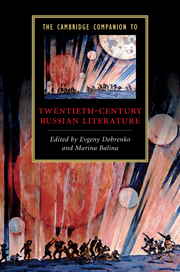Book contents
- Frontmatter
- 1 Poetry of the Silver Age
- 2 Prose between Symbolism and Realism
- 3 Poetry of the Revolution
- 4 Prose of the Revolution
- 5 Utopia and the Novel after the Revolution
- 6 Socialist Realism
- 7 Poetry after 1930
- 8 Russian Epic Novels of the Soviet Period
- 9 Prose after Stalin
- 10 Post-Soviet Literature between Realism and Postmodernism
- 11 Exile and Russian Literature
- 12 Drama and Theatre
- 13 Literature and Film
- 14 Literary Policies and Institutions
- 15 Russian Critical Theory
- Index
5 - Utopia and the Novel after the Revolution
Published online by Cambridge University Press: 28 May 2011
- Frontmatter
- 1 Poetry of the Silver Age
- 2 Prose between Symbolism and Realism
- 3 Poetry of the Revolution
- 4 Prose of the Revolution
- 5 Utopia and the Novel after the Revolution
- 6 Socialist Realism
- 7 Poetry after 1930
- 8 Russian Epic Novels of the Soviet Period
- 9 Prose after Stalin
- 10 Post-Soviet Literature between Realism and Postmodernism
- 11 Exile and Russian Literature
- 12 Drama and Theatre
- 13 Literature and Film
- 14 Literary Policies and Institutions
- 15 Russian Critical Theory
- Index
Summary
In the penultimate paragraph of The Rout (Razgrom, 1927), Alexander Fadeev abandons the action that has constituted the narrative thus far, turning instead to an unexpectedly lyrical evocation of the pastoral life that awaits the heroes upon their return from the Civil War in the Far East:
The trees came to an end quite unexpectedly, and they saw before them a vast expanse of light blue sky and red-brown, harvested fields that were flooded with sunlight and stretched away as far as the eye could see. Near a clump of willows by the deep, blue water of a small river lay a wide threshing-ground, resplendent with its peaked haystacks and golden sheaves of corn. Here a completely different life was in progress, a life that was sonorous, busy, and gay. The threshing-machine whirred with a dry, clear sound, sheaves of wheat flew through the air, and excited voices and bursts of girlish laughter could be heard amid the swirling clouds of chaff glittering in the light. Beyond the river, their lower slopes standing deep in curly-yellow woodland, dark blue mountains towered into the sky, and over their jagged peaks translucent, pinkish-white clouds, risen like foam from the salt sea far beyond, came pouring down into the valley, bubbling and frothing like milk fresh from the cow.
- Type
- Chapter
- Information
- Publisher: Cambridge University PressPrint publication year: 2011



